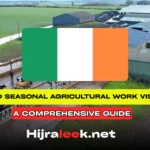France Seasonal Farm Jobs 2026 provide a remarkable opportunity for both EU and non-EU workers to participate in temporary agricultural work in one of Europe’s agricultural powerhouses. Known for its world-class wine, cereals, dairy, and fruits, France relies heavily on seasonal labor to meet the demands of its vast farming sector, particularly in regions like Bordeaux, Provence, and the Loire Valley. This comprehensive guide covers everything you need to know about securing seasonal agricultural jobs in France for 2026, including eligibility, application processes, job types, benefits, challenges, and frequently asked questions to help you embark on this rewarding journey.
Understanding Seasonal Agricultural Work in France
Seasonal agricultural jobs in France involve temporary employment, typically lasting up to six months within a 12-month period, with some contracts extending to nine months under specific conditions. These roles include tasks such as harvesting grapes, apples, cherries, or vegetables, maintaining vineyards, and assisting with dairy or livestock operations. France’s agricultural sector, spanning over 730,000 farms and 30 million acres, contributes significantly to its economy, producing high-value crops like wheat, corn, and grapes for globally renowned wines.
For non-EU workers, the travailleur saisonnier (seasonal worker) visa facilitates participation in these roles, requiring employer sponsorship and work authorization from the French labor authorities (DIRECCTE). EU/EEA/Swiss nationals enjoy visa-free access due to free movement within the Schengen Area. Peak seasons include spring (March–May) for planting and early harvests and autumn (September–October) for grape harvesting. Platforms like Hijraleek connect workers with verified employers across France’s agricultural regions.
Why Choose Seasonal Farm Jobs in France?
Seasonal farm jobs in France offer a blend of financial, cultural, and professional benefits:
- Competitive Wages: Workers earn approximately €10–€13 per hour, with an average annual salary of €25,841 for crop field workers, based on data from the ERI Economic Research Institute. The minimum wage (SMIC) in 2026 is expected to be around €11.88–€12.10/hour, pending updates.
- Employer Benefits: Many employers provide free or subsidized accommodation, meals, and sometimes transport, reducing living expenses significantly.
- Cultural Immersion: Experience France’s rich culture, from wine festivals in Bordeaux to Provençal markets, while working in its scenic countryside.
- Skill Development: Gain hands-on experience in agriculture, including harvesting techniques, vineyard management, or equipment operation, enhancing your resume.
- Legal Protections: The seasonal worker visa ensures compliance with French labor laws, guaranteeing fair wages and safe working conditions.
- Schengen Mobility: Travel within the 26 Schengen countries during off days, exploring Europe’s cultural landmarks.
- Networking Opportunities: Build connections with employers, potentially leading to future job opportunities or recommendations.
For more insights into France’s agricultural sector, visit the French Ministry of Agriculture.
Eligibility for France Seasonal Farm Jobs 2026
To qualify for France Seasonal Farm Jobs 2026, candidates must meet specific criteria, which vary slightly for EU and non-EU workers:
- Citizenship:
- EU/EEA/Swiss Nationals: No visa is required, only a valid passport or ID, due to free movement within the Schengen Area.
- Non-EU Nationals: Eligible regardless of specific bilateral agreements, provided they secure a job offer and meet visa requirements.
- Valid Job Offer: A signed, fixed-term employment contract from a French employer in the agricultural sector is mandatory. Employers must prove no suitable EU worker is available (labor market test).
- Age: Typically 21–55 years old, though employer preferences may vary.
- Health and Background Checks: Non-EU applicants need a criminal record certificate from their home country (and any country of residence for over five years), often requiring apostille and translation into French. A medical certificate may also be requested.
- Valid Passport: A passport valid for at least three months beyond the visa’s expiry date with two blank pages is essential.
- Accommodation: Proof of accommodation, such as employer-provided housing or a rental agreement, is required for non-EU workers.
- Financial Stability: Non-EU applicants may need to show sufficient funds for initial expenses, though this is often covered by the job contract.
- Physical Fitness: Agricultural work is physically demanding, requiring good health for tasks like harvesting or manual labor.
For detailed eligibility criteria, check the France-Visas official website.
Step-by-Step Guide to Applying for Seasonal Farm Jobs
Securing France Seasonal Farm Jobs 2026 involves a structured process, particularly for non-EU workers requiring a visa. Below is a detailed guide:
- Find a Job Offer: Secure a seasonal agricultural job through platforms like Hijraleek, Pôle Emploi, ANEFA (National Association for Employment and Training in Agriculture), or agricultural organizations. The contract should detail the role, duration, salary, and accommodation.
- Employer Applies for Work Authorization: For non-EU workers, the employer submits a work authorization request to the French labor authorities (DIRECCTE), proving no suitable EU workers are available. This process takes 2–6 weeks.
- Receive Work Authorization: Once approved, DIRECCTE forwards the authorization to the French immigration office (OFII) and the French consulate in the applicant’s home country.
- Apply for the Seasonal Worker Visa (Non-EU Workers): Submit a visa application at the French embassy or a visa application center (e.g., VFS Global). Required documents include:
- Completed long-stay visa application form (available on France-Visas)
- Valid passport (original and copies)
- Approved work authorization from OFII
- Signed employment contract
- Proof of accommodation (e.g., employer-provided housing or rental agreement)
- Health insurance covering at least €30,000 in the Schengen Area
- Criminal record certificate (apostilled and translated if needed)
- Recent passport-sized photos (ISO/IEC format)
- Visa fee payment receipt (€99, subject to change)
- Flight itinerary or proof of travel plans
- Attend Biometric Appointment: Provide fingerprints and a photo at the embassy or consulate. An interview may be required to verify your application.
- Receive the Visa: If approved, non-EU workers receive a Long-Stay Visa (VLS-TS) with “travailleur saisonnier” mention, valid for entry within 90 days. Processing takes 15–45 days.
- Validate Visa in France: Within two months of arrival, non-EU workers must validate their visa online via the OFII website and may need to apply for a residence permit at the local prefecture.
- Register for EU/EEA/Swiss Workers: EU workers only need to register with the local town hall (mairie) if staying longer than three months, providing proof of employment.
For visa application support, VFS Global provides services for France in many countries.
Types of Seasonal Farm Jobs in France
France’s diverse agricultural sector offers various seasonal roles, including:
- Grape Harvesters (Vendangeurs): Harvest grapes for wine production in regions like Bordeaux and Champagne. Salary: €10–€12/hour, often with accommodation.
- Fruit Pickers: Harvest apples, cherries, or strawberries in regions like Provence or the Loire Valley. Salary: €10–€11/hour.
- Vegetable Harvesters: Collect crops like asparagus or artichokes. Salary: €10–€11/hour.
- Vineyard Workers: Prune vines or maintain vineyards. Salary: €11–€13/hour.
- Livestock Assistants: Care for animals like sheep or cattle on dairy farms. Salary: €1,800–€2,200/month.
- Farmhands: Perform general tasks like planting, weeding, or irrigation. Salary: €1,600–€2,000/month.
Key Dates and Availability for 2026
France does not impose strict visa quotas for seasonal workers, but job availability peaks during specific seasons. Spring (March–May) sees demand for planting and early harvests, while autumn (September–October) is prime for grape harvesting. Job offers and visa applications typically start in late 2025 or early 2026, with announcements expected from the French government by December 2025.
Stay updated by checking the France-Visas official website or subscribing to platforms like Hijraleek for job and visa notifications.
Tips for Securing Seasonal Farm Jobs
To maximize your chances of success, consider these tips:
- Apply Early: Job offers are competitive, especially for grape harvesting. Start searching in late 2025 for 2026 opportunities.
- Use Trusted Platforms: Connect with employers through Hijraleek, Pôle Emploi, ANEFA, or Agriaffaires to find legitimate jobs.
- Prepare Documents Thoroughly: Ensure all documents for non-EU workers are complete, apostilled, and translated into French by a certified translator.
- Learn Basic French: While not mandatory, basic French skills can improve communication and job prospects.
- Verify Employer Credibility: Confirm the employer is registered with DIRECCTE and has a history of hiring seasonal workers.
- Network Locally: Contact agricultural cooperatives or attend job fairs in France to learn about opportunities.
Challenges and How to Overcome Them
Securing seasonal farm jobs in France can present challenges, but preparation can mitigate them:
- Competitive Job Market: High demand for roles like grape harvesting requires early applications. Use multiple job portals to increase your chances.
- Complex Documentation (Non-EU): Visa paperwork, including apostilles and translations, can be complex. Double-check requirements and seek assistance from VFS Global or Hijraleek.
- Language Barriers: Limited French proficiency may hinder communication. Use translation apps or take basic French lessons.
- Processing Delays: Visa processing can take 15–45 days. Apply 2–3 months before your intended start date to account for delays.
Benefits of Seasonal Farm Jobs in France
Seasonal farm jobs offer more than financial rewards:
- Cultural Experience: Live in France’s scenic countryside, enjoying local festivals, cuisine, and wine culture.
- Skill Enhancement: Learn agricultural techniques, from viticulture to crop management, boosting your career prospects.
- Legal Protections: The seasonal worker visa ensures fair wages and safe working conditions under French labor laws.
- Potential for Future Opportunities: Successful seasonal work can lead to employer recommendations or eligibility for multi-year contracts.
Frequently Asked Questions (FAQs)
1. What are seasonal farm jobs in France?
Seasonal farm jobs involve temporary agricultural work, such as grape harvesting, fruit picking, or livestock care, typically lasting up to six months.
2. Who is eligible for France Seasonal Farm Jobs 2026?
EU/EEA/Swiss nationals need no visa, only a job offer. Non-EU nationals aged 21–55 with a job offer, valid passport, and health/background checks are eligible.
3. How can I find seasonal farm jobs in France?
Use platforms like Hijraleek, Pôle Emploi, ANEFA, or agricultural cooperatives to connect with employers.
4. What documents are required for the seasonal worker visa?
Non-EU workers need a visa form, passport, work authorization, employment contract, proof of accommodation, health insurance (€30,000 coverage), criminal record certificate, and photos.
5. How long can I work with a seasonal worker visa?
The visa allows work for up to six months within a 12-month period, with possible extensions to nine months in some cases.
6. Can I bring my family with the seasonal worker visa?
The visa does not allow family accompaniment, but other visa categories, like family reunification, may be explored later.
7. How much can I earn in seasonal farm jobs?
Workers earn €10–€13/hour, averaging €25,841/year for crop field workers. Many employers provide accommodation and meals.
8. When should I apply for 2026 jobs?
Job offers and visa applications typically start in early 2026 (March–April). Check France-Visas for updates.
9. Is French language proficiency required?
No, but basic French skills can enhance job prospects and workplace integration.
10. What happens if my visa application is rejected?
Review the rejection reason, correct any issues, and reapply with a new job offer, ensuring all documents are complete.
Conclusion
France Seasonal Farm Jobs 2026 offer a unique blend of competitive wages, cultural immersion, and professional growth in one of Europe’s most vibrant agricultural sectors. Whether you’re an EU worker seeking visa-free opportunities or a non-EU worker applying for the seasonal worker visa, early preparation and trusted platforms like Hijraleek can help you secure a job. Resources like France-Visas and VFS Global provide additional support for visa applications. Start your journey today and experience the rewards of working in France’s picturesque farmlands.




















